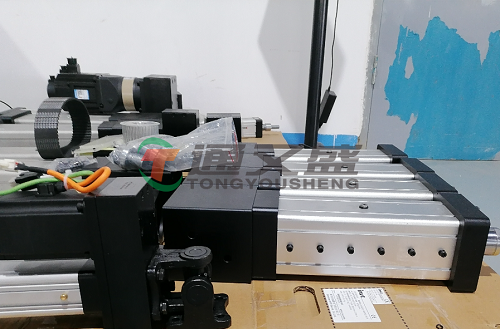High-precision servo electric cylinders are an indispensable component in modern industrial automation, offering unparalleled accuracy and efficiency in motion control.
The role of the control system in ensuring their performance cannot be overstated, as it enables precise positioning, speed regulation, and force control. As technology advances, the integration of AI and improved energy efficiency will further enhance the capabilities of these systems, solidifying their role in industries ranging from robotics to aerospace.
Applications of Servo Electric Cylinders with Control Systems
The integration of advanced control systems with high-precision servo electric cylinders opens up a wide range of applications across industries. Below are a few examples:
Robotics:In robotics, precise motion is a critical factor for tasks such as pick-and-place operations, assembly, and material handling. Servo electric cylinders provide the necessary control for robotic arms to execute movements with high precision, making them essential for automation in manufacturing environments.
Aerospace Testing:The aerospace industry requires extreme precision in testing components like aircraft wings, engines, and landing gears. Servo electric cylinders are used in test rigs where precise, controlled movements are required to simulate real-world conditions. The control systems ensure that testing parameters such as load, force, and speed are maintained accurately.
Automated Manufacturing:Automated production lines require precise handling of components during the assembly process. Servo electric cylinders with control systems are used to manipulate parts with high accuracy, reducing errors and improving the quality of the final product.
Medical Devices:In the medical field, high-precision servo electric cylinders are used in surgical robots and medical testing equipment. The accuracy and reliability of these systems are critical for procedures that require precise movements, such as minimally invasive surgeries.

Challenges in Control Systems for High-Precision Servo Electric Cylinders
While high-precision servo electric cylinders offer numerous advantages, the design and implementation of control systems present certain challenges:
Complexity:The control systems must be sophisticated enough to handle the precision required by these cylinders. This often involves advanced algorithms and real-time processing to ensure that feedback from the system is accurately interpreted and responded to.
Environmental Factors:External factors such as temperature changes, vibrations, and dust can affect the performance of the actuator and the control system. Designing systems that are resistant to these factors is a challenge for engineers.
Integration with Other Systems:In industrial environments, servo electric cylinders are often integrated with other automated systems. Ensuring seamless communication and coordination between different components can be complex and requires careful system integration.
Future Trends
The future of high-precision servo electric cylinders with control systems looks promising. As industries continue to demand higher levels of automation and precision, innovations in control systems will enable even more accurate and efficient performance. Some key trends include:
AI Integration:The integration of artificial intelligence (AI) into control systems will allow for even more advanced predictive and adaptive control, enhancing the overall performance of servo electric cylinders.
Increased Energy Efficiency:As energy consumption remains a critical concern, future control systems will focus on optimizing energy usage, making servo electric cylinders even more sustainable.
Enhanced Communication Protocols:The development of advanced communication protocols will allow for better integration with Industry 4.0 and IoT systems, enabling real-time monitoring, diagnostics, and predictive maintenance.